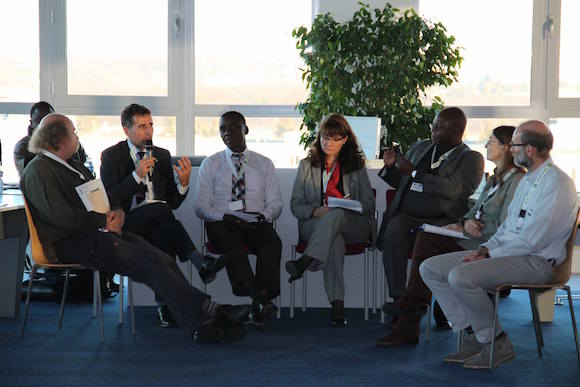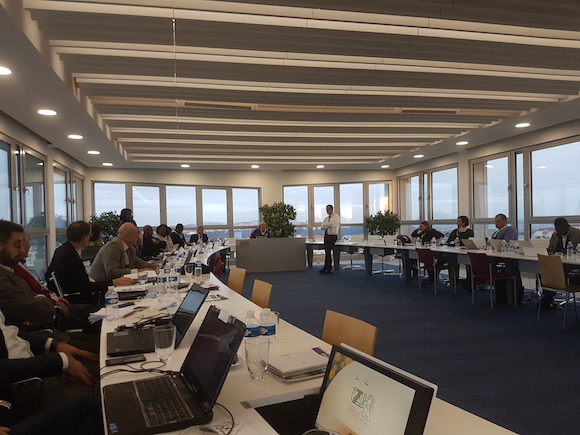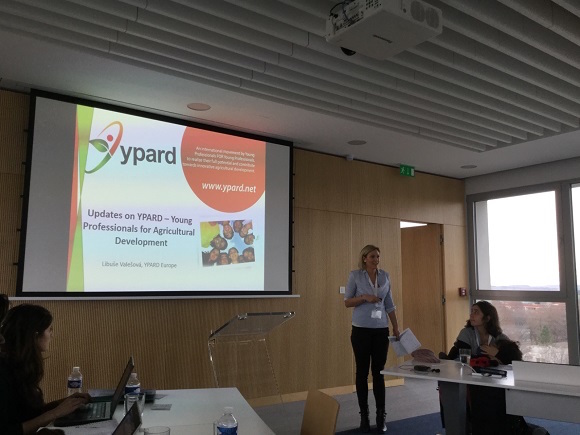-
About
- Our Work
- Get Involved
- Stay Updated

On the 29th-30th of November 2016, researchers and non-researchers from Western, Central/Eastern Europe and Africa gathered together on occasion of the annual meeting of the European Forum on Agricultural Research for Development (EFARD) held in Prague, Czech Republic.
The two days meeting was organized jointly by EFARD and Platform for African-European partnership on Agricultural Research for Development (PAEPARD) under the topic “Future of user-led research and innovation partnership”.
On the first day of the meeting, actors from different research backgrounds and policy makers made presentations on how the research trend in AR4D is changing from researcher-led to User-led or demand driven in the last few years with projections of the trend continuing in the near future.
Defining User-Led Innovation

Farmers are the first users of any kind of research and innovation initiated from the actors in the academic sector and therefore they must be the ones who decide what kind of problems/challenges the research finding should address. Or even better, they should be the ones who conduct the research in the field.
Ideally, user-led research project is a very good idea. However, according to PAEPARD representatives Mr. Remy Kahane and Mr. Jones Mugabe, involving users into the research project takes time and continued effort from both sides.
It is true that for some farmers it could be a challenge to believe in themselves and lead a research group as not every farmer considers that they are capable of doing so. But if they find a way to overcome their fear and decide to do so, the partnership will boost and enhance the research into innovation.
An interesting point aroused in the second half of the day from Mr.Roberto Aparicio, EC Policy Officer, that we should clearly define the representativeness of farmers before we speak about any kind of project. “Who is the farmer?”, “Which farmers should represent millions of poor farmers?” were his questions asked from the rest of meeting participants. He further stated that the poorest farmers whom as a researcher and EU commissioners want to reach, are very far away. Therefore it is much difficult to get their involvement into the user-led research project.
Main challenges mentioned included high communication cost, transaction cost, and time. In order for user-led research to be successful, modern farmers need to be open-minded and innovative. The communication should be as minimum time consuming and effective. Networking should result in strong and long-term partnership.
On this first day of discussions participants agreed that YPARD should bring great innovative farmers, researchers and youth energy in the future and back-up the user-led research.
On the second day, there were panel discussions and presentations of participating members that contributed to the overall goal of the meeting which was to contribute to the “Future of user-led research and innovation partnership” in Western, Central/Eastern Europe and Africa.
The YPARD Delegation at EFARD

YPARD members from Eastern and Central European Showcased Examples of Research and Innovation Partnerships led by YPARD Partner Organizations within their regions. The YPARD representatives demonstrated efforts aiming at transforming the lives of rural people. Monika Varga presented how process systems modelling & simulation help to understand and respond to users’ demands. Ivana Radic described a territorial approach to reinvent networking and collective action using a three dimensional concept; Intergenerational, Interdisciplinary, Innovative.
Davit Gogilashvili introduced the Regional Development Association (RDA), a non-profit organisation founded in Tbilisi, Georgia in 2010. As a monitoring and evaluation specialist, Davit described how RDA’s activities have increased food production and reduced rural poverty in Georgia.
Zrinka Filipovi? Dermit presented the important issues in Croatian - land degradation, hinterland depopulation and high youth unemployment. Zrinka described how to motivate and teach young professionals to work and develop business in agriculture and how to encourage early entrepreneurial mindsets.
Anudari Enkhtur introduced the agriculture sector in Mongolia and how YPARD in Mongolia is engaging youth in agriculture.
YPARD concept and activities has played and will play an important role in achieving and overcoming many challenges that the user-led research projects face.
The key messages agreed upon by all participating members after the technical meeting, Panel discussions and Group Work as well as presentations that occurred over the course of the two days even were:
The need for demonstrating impact. This was clearly asked by the EC representative, especially given the levels of investment in AR4D. It is also clear that other actors such as farmers need to see the potential impacts (on their livelihood) before engaging in and collaborating via MSHIPs or other collaborative action.
Relevance and legitimate representativeness - Who is really representing the hundred million smallholder farmers in Africa and Central and Eastern Europe? Are we targeting the right people? We need to recognize the different types of smallholder farmers and organize our interventions accordingly.
Learning lessons is central. How do we avoid recycling? Lessons learnt across countries, regions and programs should be analyzed to be able to share good practices but also to be used so as to minimize or prevent recycling of failed interventions. The EC is examining more strategic evaluation systems.
Transformative change to reach Sustainable Development Goals. Collaborative research and citizen-led innovation are key elements to ensure success of global and regional as well as to improve EU leadership in research. AGRINATURA and EFARD need to better respond to the fragility of agri-food systems that also exists in EU.
Passion, money and motivation: Insufficient funding is a constraint on European researchers’ engagement in a MSHIP yet even small amounts of money can also motivate collaboration. European researchers are also motivated to engage in a MHSIP when they have a passion for the topic. We need to mobilize both passion and resources to promote MSHIPs for development impact.
Farmers’ engagement: Farmers need to see the returns on their investment (earning) and the potential impacts on their livelihood before they engage in a MSHIP. Without leverage and monetary stimulations, farmers will not cooperate. This was well described by the YPARD team.
How can we best engage with the private sector? What are the incentives for the private sector to engage in research and innovation partnerships? However publicly funded research must be retained as it would be wrong to concede the research funding only to the private sector. International, regional and national public goods are necessary for equitable development.
Role and importance of working with young professionals. Young professionals have passion and have shown clear impact of their research work on citizens’/farmers’ livelihoods. In addition, young farmers show more interest in MSHIP whereas older farmers in transitional economies are often reluctant to cooperate.
In addition to the key notes messages and outputs of the EFARD annual meeting focused on the Future of Users’-Led Research and Innovation Partnerships, other important designations were made for the EFARD management team two members, Andre Stucki (YPARD) and Juergen Anthofer of the European Initiative for Agricultural Research for Development (EIARD) , resigned as of October 2016. Rahel Wyss, YPARD Country Representative Switzerland has been nominated to take over Andre Stucki’s position. Anna Kroutilova, AGRINATURA Secretariat and Vladimir Verner, Czech University of Life Sciences, were nominated to join the management team. No replacement was agreed upon for EIARD, which is going through a transitional period.
Apart from changes in the management team of EFARD at this annual meeting other members also reported their latest updates and future activities in the case of YPARD Europe the coordinator Libuska Valesova presented the latest updated of YPARD and has agreed upon focusing on YPARD representation in Central and Eastern Europe (Czech Republic, Slovakia, Poland, Slovenia, Estonia, Latvia, Lithuania) as well as on fundraising opportunities and will collaborate with the hosting institution for YPARD Asia and Pacific: Chinese Academy of Agricultural Sciences (CAAS).
As a young farmer or agropreneur, how often do you use a scientific research in the field? What is the importance of a research in your everyday life and business?
About the author
Related Posts
Comments
No comments made yet. Be the first to submit a commentBy accepting you will be accessing a service provided by a third-party external to https://www.ypard.net/
Get in touch
Email: [email protected]
YPARD Global Coordination UnitHosted by AGRIDEA and the Czech University of Life Sciences Prague
Lausanne, Switzerland and Prague, Czech Republic - Our Work

